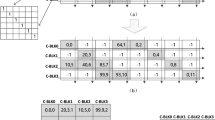Abstract
Low-Density Parity-Check (LDPC) codes are very powerful channel coding schemes with a broad range of applications. The existence of low complexity (i.e., linear time) iterative message passing decoders with close to optimum error correction performance is one of the main strengths of LDPC codes. It has been shown that the performance of these decoders can be further enhanced if the LDPC codes are extended to higher order Galois fields, yielding so called non-binary LDPC codes. However, this performance gain comes at the cost of rapidly increasing decoding complexity. To deal with this increased complexity, we present an efficient implementation of a signed-log domain FFT decoder for non-binary irregular LDPC codes which exploits the inherent massive parallelization capabilities of message passing decoders. We employ Nvidia’s Compute Unified Device Architecture (CUDA) to incorporate the available processing power of state-of-the-art Graphics Processing Units (GPUs). Furthermore, we present a CUDA implementation of the signed-log domain FFT decoder using the so-called layered update rule, in which check nodes are updated one after another. This sequential updating of nodes has been shown to converge about twice as fast as the traditional flooding scheme. To achieve a high speedup of the layered CUDA implementation, we employ quasi-cyclic non-binary LDPC codes since they allow to update multiple neighboring check nodes in parallel without any performance loss.













Similar content being viewed by others
References
Andrade, J., Falcao, G., Silva, V., Kasai, K. (2013). FFT-SPA non-binary LDPC decoding on GPU. In Proceedings IEEE International Conference on Acoustics, Speech and Signal Processing.
Barnault, L., & Declercq, D. (2003). Fast decoding algorithm for LDPC over G F(2q). In Proceedings IEEE Information Theory Workshop.
Beermann, M., Monzo, E., Schmalen, L., Vary, P. (2013). High speed decoding of non-binary irregular LDPC codes using GPUs. In Proceedings IEEE Workshop on Signal Processing Systems.
Byers, G.J., & Takawira, F. (2004). Fourier transform decoding of non-binary LDPC codes. In Proceedings Southern African Telecommunication Networks and Applications Conference.
Chen, T.P., & Chen, Y.K. (2009). Challenges and opportunities of obtaining performance from multi-core CPUs and many-core GPUs. In Proceedings IEEE International Conference on Acoustics, Speech and Signal Processing.
Cook, S. (2012). Morgan Kaufmann,
Costantini, L.,Matuz, B., Liva, G., Paolini, E., Chiani, M. (2010). On the performance of moderate-length non-binary LDPC codes for space communications. In Proceedings Advanced Satellite Multimedia Systems Conference (ASMA) and Signal Processing for Space Communications Workshop (SPSC).
Davey, M.C., & MacKay, D. J.C. (1998). Low-density parity check codes over GF(q). IEEE Communications Letters 2(6): 165–167.
Davey, M.C., & MacKay, D. J.C. (1998). Low-density parity check codes over GF(q). In Proceedings IEEE Information Theory Workshop.
Gallager, R.G. (1963). M.I.T. Press, Cambridge.
Hagenauer, J., Offer, E., Papke, L. (1996). Iterative decoding of binary block and convolutional codes. IEEE transactions communications 42(2): 429–445.
Halfhill, T.R. (2008). Microprocessor Report,
Hocevar, D. (2004). A reduced complexity decoder architecture via layered decoding of LDPC codes. In Proceedings IEEE Workshop on Signal Processing Systems.
Hu, X.Y., Eleftheriou, E., Arnold, D.M. (2005). Regular and irregular progressive edge-growth Tanner graphs. IEEE Transactions Informatics Theory 51(1): 386–398.
Khronos Group OpenCL – The open standard for parallel programming of heterogeneous systems. http://khronos.org/opencl/.
Leven, A., & Schmalen, L. (2013). Optical Fiber Telecommunications Volume VI-A. In I.P. Kaminow, T. Li, A.E. Willner (Eds.), Chapter 15: Implementation aspects of coherent transmit and receive functions in application-specific integrated circuits. Academic Press.
Liva, G., Matuz, B., Paolini, E., Chiani, M. (2012). Short non-binary IRA codes on large-girth Hamiltonian graphs. In Proceedings IEEE International Conference on Communications.
MacKay, D. J.C., & Neal, R.M. (1995). Good codes based on very sparse matrices. In 5th IMA Conference Cryptography and Coding.
Monzó E. (2010). Massive parallel decoding of low-density parity-check codes using graphic cards. Master’s thesis, RWTH Aachen University & Universidad Politecnica de Valencia. Available online: http://riunet.upv.es/bitstream/handle/10251/13736/Thesis - Enrique Monzó Solves-1.pdf. Accessed 2014.
Nilsen, C.IC., & Hafizovic, I. (2009). Digital beamforming using a GPU. In Proceedings IEEE International Conference on Acoustics, Speech and Signal Processing.
Pearl, J. (1988). Morgan Kaufmann, San Mateo.
Romero, D., & Chang, N. (2012). Sequential decoding of non-binary LDPC codes on graphics processing units. In Proceedings Asilomar Conference on Signals, Systems and Computers.
Song, H., & Cruz, J. (2003). Reduced-complexity decoding of Q-ary LDPC codes for magnetic recording. IEEE Transactions Magnetic 39(2): 1081–1087.
Tanner, R.M. (1981). A recursive approach to low complexity codes. IEEE Transactions Information Theory 27(5): 533–547.
Voicila, A., Declercq, D., Verdier, F., Fossorier, M., Urard, P. (2010). Low-complexity decoding for non-binary LDPC codes in high order fields. IEEE Transactions Communication 58(5): 1365–1375.
Wang, G., Shen, H., Yin, B., Wu, M., Sun, Y., Cavallaro, J.R. (2012). Parallel non-binary LDPC decoding on GPU. In Proceed ings Asilomar Conference on Signals, Systems and Computers.
Wymeersch, H., Steendam, H., Moeneclaey, M. (2004). Log-domain decoding of LDPC codes over GF(q). In Proceedings IEEE International Conference On Communications.
Zhang, J., & Fossorier, M. (2002). Shuffled belief propagation decoding. In Proceedings Asilomar Conference on Signals, Systems And Computers.
Author information
Authors and Affiliations
Corresponding author
Additional information
Parts of this paper have been presented at the 2013 IEEE Workshop on Signal Processing System under the title “High Speed Decoding of Non-Binary Irregular LDPC Codes Using GPUs” [3]
Rights and permissions
About this article
Cite this article
Beermann, M., Monzó, E., Schmalen, L. et al. GPU Accelerated Belief Propagation Decoding of Non-Binary LDPC Codes with Parallel and Sequential Scheduling. J Sign Process Syst 78, 21–34 (2015). https://doi.org/10.1007/s11265-014-0927-7
Received:
Accepted:
Published:
Issue Date:
DOI: https://doi.org/10.1007/s11265-014-0927-7




